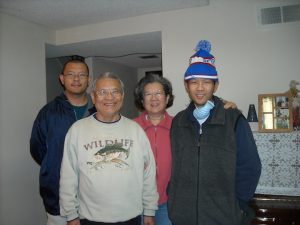
Though family members often share similar genetic composition and have the closest bone marrow matches, none of Chin’s immediate family member’s matched his — including his twin brother Jim Chin‘s. Since Jan. 13, when Jack Chin was informed of his need for a bone marrow transplant, the family has been searching for a match from unrelated persons. According to the AADP, about 70 percent of other patients with such diseases affecting the immune system are unable to find a bone marrow match within the family, and the likelihood of finding a matching donor who is unrelated to the patient is one in 20,000.
The AADP encourages and enrolls its donors in the Be the Match program, which specifically targets younger donors between the ages of 18 and 44, as they tend to produce more viable cells, thus leading to a more successful transplant.
Such transplants, however, can be successful with closely matching Human Leukocyte Antigens. HLAs are white blood cell markers that are genetically inherited, therefore the HLA’s of a donor and a recipient of the same ethnicity are more likely to closely match. In order for a successful transplant to happen, six out of the eight important HLA markers must match. For this reason, organizations such as the AADP are geared towards increasing the amount of donors from different ethnicities in the registry.
Class of 2007 alumnus and Jack Chin’s childhood friend Chris Lo emphasized the importance of Asians and other underrepresented ethnic groups registering to be donors. Currently, according to the Be the Match program, only seven percent of the potential adult donors are of Asian ethnicity, further decreasing Chin’s chances of finding a matching Chinese donor. Lo sees the demographics of the MVHS community as a way to increase the likelihood of finding a match.
“The [number of donors in the] Asian American registry is ridiculously low, so the chances of saving Jack are pretty slim,” Lo said. “But it can happen to anyone. If it happened to you or your family, you’d want as many people as possible on your registry.”
After hearing of Jack Chin’s condition, art teacher Brian Chow and science teacher Pamela Chow, who both taught Jim Chin, attended the bone marrow drive at the Cupertino Library on Feb. 5 and were inspired to hold one at MVHS to further support Jack Chin and his family.
“We were very concerned … he’s 23 and you just feel really bad for the family that they have to go through this,” Pamela Chow said. “It’s certainly not easy, I imagine.”
According to Pamela Chow, the AADP normally asks for two or three weeks notice to hold a drive because it must first receive permission from the planned venue. However, Principal April Scott contacted the AADP on Feb. 6 after speaking with the two and was able to set up a drive to be held within five days. Since then, staff members and administrators have volunteered to donate and help run the drive.
“We really thought that this was a great place to start to build this kind of momentum. We’re doing it right here in his backyard in the school he went to, and getting the parents involved,” Brian Chow said. “[MVHS] is a pretty small community, you’re going to have people you know after you graduate. All of sudden, that connection happens.”
Currently Brian Chow is building a public relations campaign to further develop this drive into several extended events throughout the year, specifically at Octagon’s annual Cure Cancer Cafe on March 24, FUHSD Foundation fundraisers, board meetings, as well as the sports Boosters Crab Feed. The Chows and Scott agreed that the senior boys basketball game on Feb. 10 would serve as the perfect opportunity to create an immediate response from the MVHS community.
“It’s basically all hands on deck. Everybody can help with this,” Brian Chow said. “It’s not just ‘Let’s just have a nice drive and maybe we’ll get something out of it.’ It’s like, ‘No, let’s keep pushing more’ because there’s always going to be people that need this. We’re not just pushing the ball, we’re making it run on its own.”
According to Lo, who previously registered as a donor, the process of registering only takes about five to ten minutes.
“It’s just a cheek swab, and people need to understand that it’s pretty painless,” Lo said. “It’s not as bad as it seems.”
Only those 18 and above can register to be donors, and though the Chows and Lo realize that this criteria may limit the number of students who are eligible to donate, they nonetheless believe that spreading the word to others will generate a large response.
“It is pretty difficult to find students that are eligible,” Lo said. “But if they can bring their parents and older siblings, that would be a great help.”
The AADP will be holding a donor registry in the gym lobby on Feb. 10 from 3 p.m. to 6 p.m. Eligible donors must be over 18 to register, and can also register online by ordering a swab kit. Those interested in staying updated with the progress of Jack’s search can follow Operation Save Jack on Twitter and Facebook. Check back on Feb. 9 to hear from Jack Chin.







